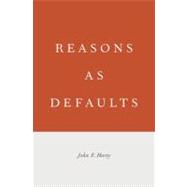
Note: Supplemental materials are not guaranteed with Rental or Used book purchases.
Purchase Benefits
Looking to rent a book? Rent Reasons as Defaults [ISBN: 9780199744077] for the semester, quarter, and short term or search our site for other textbooks by Horty, John F.. Renting a textbook can save you up to 90% from the cost of buying.
| Introduction | p. 1 |
| Default logic | p. 13 |
| A primer on default logic | p. 15 |
| Basic concepts | p. 15 |
| Default rules | p. 15 |
| Priority relations | p. 18 |
| Theories and scenarios | p. 22 |
| Central definitions | p. 25 |
| Binding defaults | p. 25 |
| Proper scenarios and extensions | p. 30 |
| Extensions and conclusions | p. 34 |
| Theories with multiple extensions | p. 34 |
| Theories without extensions | p. 38 |
| From defaults to reasons | p. 41 |
| An austere theory of reasons | p. 41 |
| Developing the theory | p. 47 |
| Conflict, strength, and defeat | p. 47 |
| Reasons and enablers | p. 53 |
| Reason amalgamation | p. 59 |
| Deontic logic | p. 63 |
| Reasons and oughts | p. 65 |
| The two logics | p. 68 |
| Simple oughts | p. 69 |
| Conditional oughts | p. 74 |
| Some history | p. 76 |
| Properties of the logics | p. 80 |
| Moral conflicts | p. 86 |
| Logical objections | p. 87 |
| Agglomeration | p. 87 |
| Other logical objections | p. 92 |
| Conceptual objections | p. 96 |
| Objections based on reasons as moral forces | p. 102 |
| Some elaborations | p. 109 |
| Variable priorities and exclusion | p. 111 |
| Variable priority default theories | p. 111 |
| The definition | p. 111 |
| Some examples | p. 114 |
| Exclusionary default theories | p. 121 |
| The definition | p. 121 |
| Some examples | p. 126 |
| Discussion | p. 130 |
| Downward closure of exclusion | p. 130 |
| Exclusion by weaker defaults | p. 135 |
| Excluders, intensifiers, and attenuators | p. 141 |
| Particularism | p. 147 |
| Dancy's argument | p. 148 |
| Evaluating the argument | p. 150 |
| Discussion | p. 155 |
| Pragmatic considerations | p. 156 |
| Borrowing a book | p. 157 |
| Moderate particularism | p. 160 |
| Some complications | p. 167 |
| Skepticism and floating conclusions | p. 169 |
| Floating conclusions | p. 169 |
| Arguments and paths | p. 170 |
| Two versions of skepticism | p. 174 |
| The problem with floating conclusions | p. 179 |
| An example | p. 179 |
| Objections to the example | p. 183 |
| Discussion | p. 186 |
| Other examples | p. 186 |
| Skepticism | p. 190 |
| Problems with priorities | p. 192 |
| Refining the concept of defeat | p. 192 |
| Controlling the order of application | p. 197 |
| Discussion | p. 206 |
| Inappropriate equilibria | p. 206 |
| Other orderings | p. 209 |
| Reinstatement | p. 211 |
| Appendices | p. 219 |
| Notes on the default logics | p. 221 |
| Proper scenarios | p. 221 |
| Some observations on defeat | p. 227 |
| Normal default theories | p. 228 |
| Notes on the deontic logics | p. 234 |
| A comparison with van Fraassen's logic | p. 234 |
| A comparison with standard deontic logic | p. 238 |
| Bibliography | p. 241 |
| Index | p. 251 |
| Table of Contents provided by Ingram. All Rights Reserved. |
The New copy of this book will include any supplemental materials advertised. Please check the title of the book to determine if it should include any access cards, study guides, lab manuals, CDs, etc.
The Used, Rental and eBook copies of this book are not guaranteed to include any supplemental materials. Typically, only the book itself is included. This is true even if the title states it includes any access cards, study guides, lab manuals, CDs, etc.